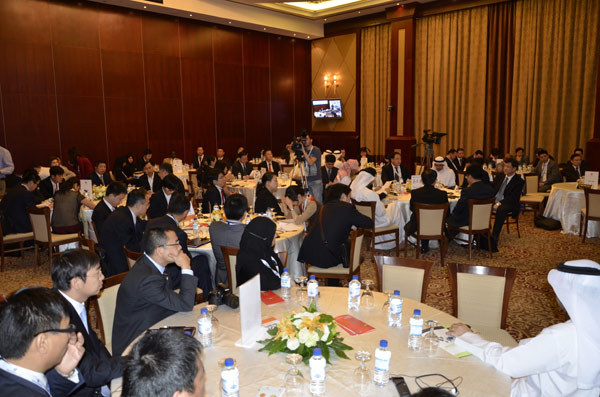
More than 300 participants from China and Gulf Cooperation Council states were given an opportunity to get a better understanding of each other through views exchanges and discussions during the China-GCC States Forum on Sustainable Development in Abu Dhabi, capital of the United Arab Emirates on Dec 12, 2012.
![Participants listen to the speaker during during the China-GCC States Forum on Sustainable Development in Abu Dhabi, capital of the United Arab Emirates on Dec 12, 2012.[Photo/chinadaily.com.cn] Find consensus, look for cooperation](../../../images/2012cngccforum/attachement/jpg/site1/20121217/d4bed9d4d2201239677f28.jpg) |
|
Participants listen to the speaker during during the China-GCC States Forum on Sustainable Development in Abu Dhabi, capital of the United Arab Emirates on Dec 12, 2012.[Photo/chinadaily.com.cn] |
Consensus found
Despite different backgrounds, representatives from different countries and different circles found a common necessity to restructure their economies in a bid to achieve sustainable development.
"Through the forum, I feel strongly that even if China and the GCC states have different political systems, ideologies and cultural customs, both sides are consistent in pursuing sustainable development," said Li Jinjun, vice-minister of the International Department of the Communist Party of China.
Li was echoed by Mohammed Saleh Shelwah al-TunaijI, assistant undersecretary for economic policy of the UAE's Ministry of Economy. "GCC states also stress sustainable development and make great efforts on economic transformation and the knowledge economy," said al-Tunaiji.
The UAE proposed a strategy to develop a green economy in 2011, focusing on exploring available new energy sources, developing green technologies, protecting the environment, reducing carbon emissions and increasing the utilization rate of water.
"We are prepared for implementing cooperation in these fields and sharing experiences with China," said Abdul Aziz Aluwaisheq, assistant secretary general for Negotiation and Strategic Dialogue of the GCC.
Cooperation expected
In 2011, China-GCC trade jumped 44.5 percent year-on-year to $133.8 billion, with Chinese exports to the region surging by 30 percent and imports increasing by 53.8 percent. Heads of China and the Arab states set a trade target of $300 billion by 2014.
"We feel delighted that the bilateral economic ties have remained strong in recent years and see a gradual increase in trade," said Abdul Latif bin Rashid al-Zayani, secretary general of the GCC. "We should turn our attention to these fields concerning sustainable development and look for a more comprehensive cooperation."
 |
|
Special dialogue session on GCC-China Investment and Trade Prospect. |
China and the GCC have different economies, but they complement each other, which means huge cooperating potential from both sides.
"The GCC and China have a tremendous cooperating potential," said Abdul Rahim Hassan Naqi, secretary general of the Federation of GCC Chambers. Chinese companies can find promising prospects in oil and energy sectors in the GCC sates, said Naqi.
Both sides should work together to push forward some other cooperation in the Gulf region on many infrastructure projects including railways, hospitals and schools, said Naqi
China is one of the world's biggest oil importers while the GCC states are the world's largest producers of crude oil, accounting for about 20 percent of global supply and 40 percent of proven oil reserves.
By 2015, 55% of energy consumed by China will come from the Gulf region, said Naqi.
On the other hand, China is one of the world's biggest commodities suppliers, able to provide enough cheap and high-quality products for the Gulf region.
Meanwhile two-way investment was also urged in the forum. "China and the GCC states need to further increase their two-way investments and create a favorable environment for investing," said Abdul Aziz Aluwaisheq.
China's experience of infrastructure construction can help the GCC states to build railways, schools and hospitals etc, according to Wang Jianye, chief economist of the Export-Import Bank of China.
The GCC states want to develop their domestic industries through partnerships and their sound infrastructures can provide a good environment for foreign investors, said Naqi.
To develop a diversified economy, the GCC states welcome cooperation with foreign partners to help develop their domestic industries, said al-Tunaiji who also urges an increase in the region's exports.
Meanwhile China's huge population, along with a growth in per capita income, may create huge demand.
"The GCC states and China hold a common wish to strengthen bilateral economic relations," said Abdul Latif bin Rashid al-Zayani. "We believe that we are able to bring more benefits and welfare to our people through dialogue and coordination."